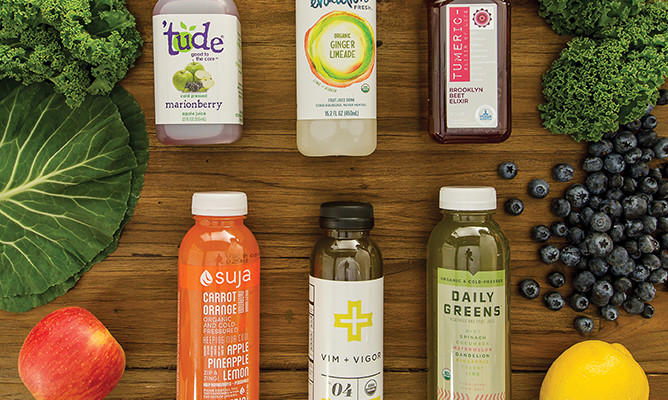From cold press to pasteurization to high-pressure processing, we took a fresh look at the most popular juicing methods and just how good they really are for you.
In terms of minor luxuries, is there a more irresistible purchase than a bottle of high-end juice? Juicing is on-trend, and the bright, jewel-like colors of juices (emerald green kales! Ruby red beets!) are so tempting that, even at $6-12 a pop, juicing is an indulgence that doesn’t even really feel indulgent — not the way a croissant does — because it tastes so healthful and fresh.
The juices you’ll find at your local grocery or health food shop can bear a bunch of different labels, however — cold-press (juice extracted with a hydraulic press and slow pulverizer without generating any heat), HPP (high-pressure processed), or pasteurized (given heat treatment that destroys harmful microorganisms) — but are any of them really better for you than the others? Or are all of these just variations on expensive, useless sugar-water?
Related: Get Your Juice On With Hannah Peterson of Joyful Juicing
The answer is layered. Most fruits and vegetables spend a long time traveling from the farm where they were grown, and just as long, or longer, hanging out in the fridge, waiting for you to consume them. Even local produce may spend a few days riding on a truck into town, and fruit grown overseas is often in transit for weeks on end. All of this waiting degrades the produce’s integrity, losing moisture — along with valuable vitamins and nutrients — to transportation and storage time.
Technically speaking, if you’re looking for ideal freshness, you shouldn’t be consuming grocery store produce at all, in juice form or otherwise. In a perfect world, you’d simply breeze out of your home in the morning, pluck fresh vegetables and fruits from your pristinely cantilevered garden, place each berry gently in a wicker basket, then prepare your garden-fresh breakfast. But your life isn’t an Under the Tuscan Sun dreamscape, and that’s not necessarily a bad thing. You’ve got bigger things to worry about than whether the produce you’re consuming is absolutely perfect. In other words, you have a life outside of what you eat.
So, if the fruits and vegetables you’re consuming are already diminished in quality because they’ve been sitting around on a truck, does it even matter that you’re throwing a little HPP or pasteurization on top of it?
This idea of freshness, and, in fact, the very word “fresh,” has been hotly contested in the last year. Last summer, a judge heard a case against BluePrint, the hyper-popular juice company that Food and Wine has heralded as “the cleanse for foodies.” Take one sip of their product, and you’ll see why: BluePrint’s juices are balanced, flavorful, and delicious. The plaintiff’s claim, however, didn’t have to do with the product’s tastiness — he was instead concerned that juices treated with high pressure processing, or HPP, shouldn’t get to call themselves “unpasteurized” or “raw,” on the packaging, and contended that HPP is as problematic as traditional pasteurization methods, which have been shown in some studies to inactivate probiotics and enzymes. However, the judge dismissed the plaintiff’s case, noting that the very studies he brought to court supported the juice-maker’s side, not his own. There was no actual evidence presented that could indicate that HPP was damaging in any significant degree to the products. The case was promptly thrown out.
This isn’t the first — nor will it be the last — lawsuit against a juice company regarding labeling issues. Questions about how to label the technologies often arise; in the world of juicing, questions currently include whether HPP-treated juice companies can call themselves “fresh” (currently, no), “raw” (yes), or “natural” (yes). Generally speaking, the labels don’t seem to help consumers all that much, since the terms feel interchangeable to anybody but a lawyer or a robot.
Despite this, HPP is becoming more and more popular as a method of preserving juices. Traditional pasteurization, which uses heat to kill harmful pathogens (and is still the best bet for pregnant or immuno-compromised juice drinkers), has been shown in studies to destroy some valuable nutrients, whereas Dr. Luke LaBorde, a food scientist at Penn State University, noted that “In general, nutrient destruction during HPP processing is lower compared to heat treatments.”
Related: This is Your Salad on Steroids
Recently, trendy brands like Liquiteria — which was formerly cold-press only — have started HPP processing their juices. When we reached out to them about this new choice of practice, they declined to comment, stating that they don’t want to discuss the HPP process with the press. Whether they’re afraid of the public’s reaction, drawing attention to themselves in connection to the issue, or have another reason to stay silent remains a matter of speculation.
For some, the safest rule of thumb is the fresher, the better, and those consumers prefer to simply eat fruits and vegetables from the farmers market instead of drinking them from a vendor. In fact, if you’re going to go that route, Mind+Matter’s lead dietician, Sam Accardi, recommends “blending your own juice in a high-powered blender, as opposed to using a juice extractor.”
The cold press method is trending heavily — this process reduces oxidization, which allows juices to be consumed for up to 48 hours after juicing. However, the problem with cold-pressed juice is that you’re often paying top dollar for a juice that’s been sitting around for a couple of days and, arguably, isn’t any better than an HPP juice.
As with anything food- and health-related, there are plenty of opinions about whether processing — be it cold press, HPP, or pasteurization — is okay for juices at all. Scientific advancement isn’t the enemy, but there is a range of effects that these various processes can generate, and there hasn’t been enough research conducted concerning the vitamin retention of each plant in these processes to make final determinations just yet.
The good news, however, is that all of the food scientists we reached out to unanimously agreed that HPP isn’t actually problematic. “HPP juices are as good (within 95 percent) as fresh juice in terms of taste, vitamin, and color retention, I would say,” Dr. Mukund Karwe, Professor of Food Engineering at Rutgers University, tells us. “Neutralizing enzymes is not such a bad thing. Some of the enzymes turn juice brown during storage — these enzymes have no nutritional value.”
Based on current studies, it appears that some individual vitamins are affected by processes more than others. Dr. Laborde notes that “there are slight differences depending on the type of juice and the nutrient studied.”
Related: 6 Healthy Cookbooks You Need in Your Kitchen
In a comprehensive review, Dr. Diane M. Barrett of UC Davis found that, generally, most nutrients appear to be minimally affected by high-pressure processing — provided there’s no heat processing in addition. For instance, high-pressure processing orange juice appears to only reduce vitamin C by 10 percent, which is considered to be a reasonable loss. She notes that most studies find that vitamin A is pretty hardy, whereas folate loss has been observed to be over 50 percent. Interestingly, vitamin content even appears to increase in certain fruits and vegetables through HPP. The vitamin A in persimmons, for instance, actually increased 45 percent after high-pressure processing.
What is reasonable when it comes to losing percentages of vitamins? Physician and weight loss expert Dr. Barry Mennen explains his physician’s perspective on these types of controversies: “We go way beyond the available data in making claims about issues that have no proven clinical benefit — for instance, as a hypothetical, say one preparation method of orange juice allows 78 percent of vitamin C to remain available for absorption, while another prep method allows 96 percent of the vitamin to be available. Yes, there is a difference, but does this have any discernible effect on fitness or health? That would be very hard to prove. The proof of effect is what physicians want to see before recommending any product to our patients.”
Whether some additional losses (and occasional gains) in vitamin content are okay by you is a personal choice you’ll want to make when choosing a juicing method — or choosing juice at all. Dr. Mennen believes that you should “drink fresh squeezed when you can. Whenever food is industrially processed, we, of course, lose something. But in the grand scheme of things, an occasional glass of processed juice won’t matter.”
However, he also reminds us that juice itself often contains a lot of sugars, which can spike insulin levels and prevent fat breakdown, so despite how beautiful the bottles are, perhaps substance should take precedence over style where our health is concerned.
More on Healthy Snacks…
Should You Get in on the Green Juice Trend?
7 Healthy DIY Protein Bars That Blow Your Quest Bar Out of the Water

